Toyota Yaris Cross VS Opel Mokka
In the competitive subcompact SUV segment, the Opel Mokka stands out with its bold design and engaging driving dynamics, offering a sporty feel that appeals to urban drivers. On the other hand, the Toyota Yaris Cross impresses with its practicality and hybrid efficiency, making it a great choice for eco-conscious consumers seeking a versatile vehicle. Ultimately, the Mokka's stylish flair contrasts with the Yaris Cross's dependable functionality, catering to different preferences within the growing crossover market.
Toyota Yaris Cross
The Toyota Yaris Cross combines the practicality of a compact SUV with the agility of a smaller car, making it ideal for urban adventures. Its elevated seating position offers excellent visibility, while the stylish design ensures it stands out on the city streets. Inside, the Yaris Cross boasts a modern interior with advanced technology features designed to enhance the driving experience.
detailsOpel Mokka
Der Opel Mokka beeindruckt mit seinem markanten Design und einem Innenraum, der modernen Komfort mit intuitiver Technologie kombiniert. Das Fahrzeug bietet ein dynamisches Fahrerlebnis und eignet sich sowohl für die Stadt als auch für längere Fahrten. Mit seiner effizienten Motorisierung setzt der Mokka zudem auf zeitgemäße Nachhaltigkeit.
detailsOpel Mokka vs. Toyota Yaris Cross: A Comprehensive Comparison
The automotive market is always buzzing with innovation, and two prominent contenders in the compact SUV segment for 2024 are the Opel Mokka and the Toyota Yaris Cross. Both vehicles offer a blend of practicality, efficiency, and modern technology. Here, we’ll explore their technical features and innovations to help you determine which SUV suits your lifestyle best.
Engine Performance and Efficiency
Under the hood, the Opel Mokka offers a variety of engine options, including petrol, petrol MHEV, and electric variants. The petrol engines produce between 130 and 156 HP, while the electric version boasts an impressive range of up to 403 km and a battery capacity of 51 kWh. With a consumption rate of roughly 6.1 to 6.2 L/100km for petrol and 15.4 kWh/100km for electric, the Mokka provides a compelling eco-friendly option.
In contrast, the Toyota Yaris Cross is equipped with a hybrid powertrain that produces between 116 and 130 HP. This hybrid setup is more fuel-efficient, boasting consumption figures around 4.5 to 4.8 L/100km. Moreover, the Yaris Cross generates lower CO2 emissions, ranging from 101 to 108 g/km, showcasing Toyota’s commitment to sustainability without sacrificing performance.
Transmission and Driving Experience
The Mokka employs a variety of transmission options, including both manual and automatic gearboxes, which provides flexibility in driving style. Whether you prefer the precision of a manual or the convenience of an automatic, the Mokka caters to your needs. Acceleration is impressive, with a 0-100 km/h time of just 9 seconds for the sporty models.
On the other hand, the Yaris Cross features a smooth CVT automatic transmission that enhances fuel efficiency while maintaining a serene driving experience. However, its acceleration time lagging behind the Mokka at 10.7 to 11.3 seconds suggests that it is more focused on economy and comfort rather than sporty performance.
Interior Space and Comfort
Both vehicles comfortably seat five passengers but differ slightly in their interior dimensions and cargo capacity. The Opel Mokka has a trunk capacity of 310 to 350 liters, depending on the model, making it practical for daily errands. Meanwhile, the Toyota Yaris Cross edges ahead in storage space, featuring a trunk that can hold 320 to 397 liters, providing added versatility for family trips.
Furthermore, the Yaris Cross has a height advantage, standing at 1595 mm, compared to the Mokka’s 1535 mm. This additional height can contribute to a more spacious feel inside, especially for taller passengers. However, the Mokka's design offers a modern interior, with quality materials that are inviting and functional.
Dimensions and Weight
The dimensions of these SUVs are relatively comparable, but the Yaris Cross is slightly longer at 4180 mm versus the Mokka's 4150 mm. This minimal difference might not greatly impact maneuverability, as both vehicles are designed for urban environments and provide front-wheel drive stability.
In terms of weight, the Mokka ranges from 1294 to 1362 kg, while the Yaris Cross is lighter, with weights ranging from 1180 to 1290 kg. The lighter weight of the Yaris Cross could enhance agility and efficiency, further contributing to its fuel-saving capabilities.
Safety and Innovations
Safety is a prime concern for both Opel and Toyota. The Mokka features advanced safety technologies, including adaptive cruise control and lane-keeping assistance, that help ensure driver and passenger safety on the road. In instances where avoiding collisions is vital, the Mokka stands ready with a suite of features designed for preventive actions.
The Yaris Cross is equipped with Toyota's Safety Sense technology, encompassing pre-collision systems, lane departure alerts, and adaptive headlights. This proactive approach to safety underscores Toyota's dedication to enhancing driving confidence, making it a strong contender in the safety aspects of this comparison.
Conclusion: Which SUV Should You Choose?
In the battle between the Opel Mokka and the Toyota Yaris Cross, both vehicles offer unique strengths. If you are looking for a sporty driving experience, modern design, and multiple engine options, the Mokka could be your choice. However, if fuel efficiency, lower emissions, and exceptional safety features are your priorities, the Yaris Cross stands out as a remarkable full hybrid option.
Ultimately, your decision will depend on your driving habits, environmental considerations, and personal style. Whichever you choose, both the Opel Mokka and the Toyota Yaris Cross are impressive vehicles tailored to meet the demands of contemporary driving.
 @ Toyota
@ Toyota
 @ Toyota
@ Toyota
 @ Toyota
@ Toyota
 @ Toyota
@ Toyota
 @ Toyota
@ Toyota
 @ Toyota
@ Toyota
 @ Toyota
@ Toyota
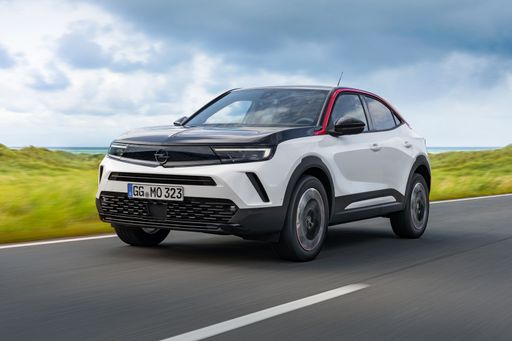 @ media.stellantis.com
@ media.stellantis.com
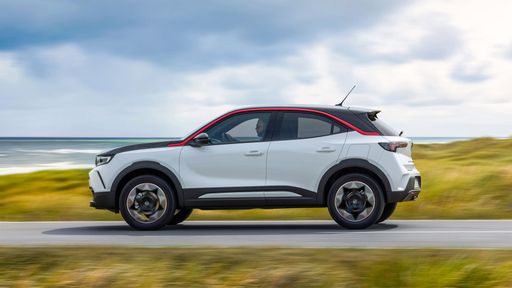 @ media.stellantis.com
@ media.stellantis.com
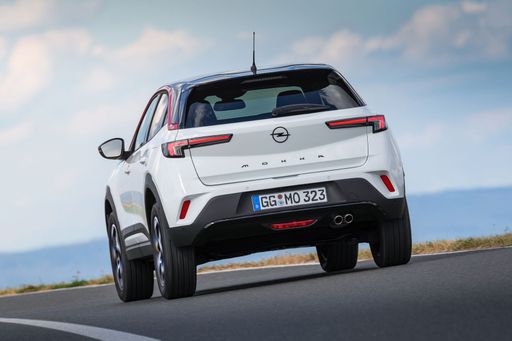 @ media.stellantis.com
@ media.stellantis.com
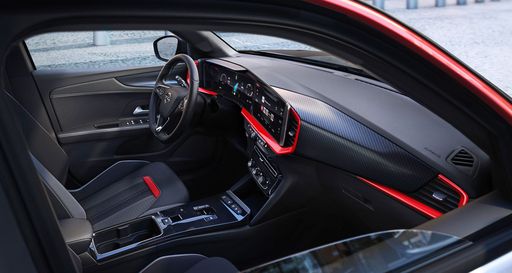 @ media.stellantis.com
@ media.stellantis.com
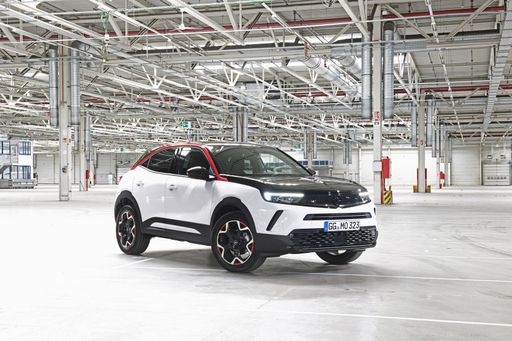 @ media.stellantis.com
@ media.stellantis.com

|

|
|
|
|
Costs and Consumption |
|
|---|---|
|
Price
about 26100 - 36600
$
|
Price
about 24700 - 36000
$
|
|
Consumption L/100km
4.5 - 4.8
L
|
Consumption L/100km
4.8 - 6.2
L
|
|
Consumption kWh/100km
-
|
Consumption kWh/100km
15.4
kWh
|
|
Electric Range
-
|
Electric Range
402 - 403
km
|
|
Battery Capacity
-
|
Battery Capacity
51
kWh
|
|
co2
101 - 108
g/km
|
co2
137, 139, 127, 128, 108, 0
g/km
|
|
Fuel tank capacity
36
L
|
Fuel tank capacity
44
L
|
Dimensions and Body |
|
|
Body Type
SUV
|
Body Type
SUV
|
|
Seats
5
|
Seats
5
|
|
Doors
5
|
Doors
5
|
|
Curb weight
1180 - 1290
kg
|
Curb weight
1294 - 1615
kg
|
|
Trunk capacity
320 - 397
L
|
Trunk capacity
310 - 350
L
|
|
Length
4180
mm
|
Length
4150
mm
|
|
Width
1765
mm
|
Width
1787
mm
|
|
Height
1595
mm
|
Height
1535
mm
|
|
Payload
485 - 510
kg
|
Payload
388 - 400
kg
|
Engine and Performance |
|
|
Engine Type
Full Hybrid
|
Engine Type
Petrol, Petrol MHEV, Electric
|
|
Transmission
Automatic
|
Transmission
Automatic, Manuel
|
|
Transmission Detail
CVT
|
Transmission Detail
Automatic Gearbox, Manual Gearbox, Automat. Schaltgetriebe (Doppelkupplung), Reduction Gearbox
|
|
Drive Type
Front-Wheel Drive
|
Drive Type
Front-Wheel Drive
|
|
Power HP
116 - 130
HP
|
Power HP
130 - 156
HP
|
|
Acceleration 0-100km/h
10.7 - 11.3
s
|
Acceleration 0-100km/h
9 - 9.2
s
|
|
Max Speed
170
km/h
|
Max Speed
150 - 207
km/h
|
|
Torque
-
|
Torque
230 - 260
Nm
|
|
Number of Cylinders
3
|
Number of Cylinders
3
|
|
Power kW
85 - 96
kW
|
Power kW
96 - 115
kW
|
|
Engine capacity
1490
cm3
|
Engine capacity
1199
cm3
|
|
Top speed
170
km/h
|
Top speed
150 - 207
km/h
|
General |
|
|
Model Year
2024
|
Model Year
2024
|
|
CO2 Efficiency Class
C
|
CO2 Efficiency Class
E, D, C, A
|
|
Brand
Toyota
|
Brand
Opel
|
Toyota Yaris Cross
Discovering the Toyota Yaris Cross: The Compact SUV Redefined
The Toyota Yaris Cross has boldly entered the compact SUV market, sporting a blend of sleek aesthetics, advanced hybrid technology, and practical functionality. As urban driving dynamics evolve, this vehicle meets the demands of modern motorists with an impressive performance and eco-friendly technology, setting itself apart in a bustling segment.
Performance and Efficiency: Hybrid Innovation at Its Best
The Yaris Cross is designed to provide an engaging driving experience combined with remarkable efficiency. At its heart lies a full hybrid powertrain, offering options between 116 PS and 130 PS, efficiently paired with Toyota's CVT automatic transmission. The hybrid system seamlessly integrates a petrol engine with an electric motor, optimising power delivery and responsiveness.
Drivers will appreciate the low fuel consumption, which ranges from 4.5 to 4.8 litres per 100 km, and equally impressive CO2 emissions of 101 to 108 g/km, aligning with the industry's ongoing commitment to sustainability.
Design and Dimensions: Compact Yet Spacious
The Yaris Cross offers a perfect blend of compact design and interior spaciousness, making it an ideal choice for urban environments. Measuring 4,180 mm in length, 1,765 mm in width, and 1,595 mm in height, the vehicle manages to provide a refined SUV stature without sacrificing manoeuvrability.
Its five-door layout and flexible boot space, ranging from 320 to 397 litres, make it practical for everything from city commutes to weekend getaways. The increased ride height adds to the SUV appeal, providing drivers with that coveted higher driving position and improved visibility.
Advanced Technology and Features
The Toyota Yaris Cross is well-equipped with an array of technological features, defined by its various trim levels including the Business Edition CVT, Comfort CVT, and the sporty GR Sport CVT. Each model is crafted to cater to diverse consumer needs, whether one prioritises enhanced comfort, sporty aesthetics, or comprehensive safety features.
Key innovations include a state-of-the-art infotainment system, advanced driver assistance features, and the Toyota Safety Sense package that enhances driver confidence through adaptive cruise control, lane keep assist, and more.
Driving Experience: Safety and Comfort in Focus
The Yaris Cross is not just about performance but also ensures safety and comfort for all occupants. The vehicle offers a smooth and quiet ride thanks to its refined suspension system and cleverly designed cabin, reducing noise and vibration levels.
The advanced safety suite within the Yaris Cross, encompassing multiple airbags, stability control, and a host of driver assistance systems, is designed to provide protection and peace of mind, every time you step into the driver's seat.
Conclusion: A New Benchmark in the Compact SUV Segment
The Toyota Yaris Cross stands as a testament to Toyota's commitment to producing environmentally friendly vehicles without compromising on performance or style. It strikes a harmonious balance between innovation, efficiency, and practicality, offering consumers a compact SUV that is both exciting to drive and easy to live with.
As we move further into an era of hybrid advancements and smarter automotive solutions, the Yaris Cross embodies these principles exceptionally, proving to be a robust and reliable partner for the modern driver.
Opel Mokka
Der neue Opel Mokka: Ein spektakuläres Comeback
Der Opel Mokka hat in den letzten Jahren eine bemerkenswerte Transformation durchlaufen. Das kompakte SUV ist nicht nur optisch ein Hingucker, sondern überzeugt auch mit technischer Raffinesse und innovativen Features. Die aktuelle Modellreihe bietet sowohl herkömmliche Benzinmotoren als auch moderne Elektro- und Hybridantriebe, die auf nachhaltige Mobilität setzen.
Vielfalt in der Motorisierung
Beim Opel Mokka stehen verschiedene Motorvarianten zur Auswahl, die auf unterschiedliche Fahrgewohnheiten und Bedürfnisse zugeschnitten sind. Die Benzinmotoren, ausgelegt auf 100 bis 130 PS, überzeugen mit einem angenehmen Fahrverhalten und einem Verbrauch von 5,7 bis 6,1 Litern pro 100 Kilometer. Wer mehr Effizienz wünscht, kann sich für den 48V Mild-Hybrid-Antrieb entscheiden, der mit einem Verbrauch von nur 4,9 Litern pro 100 Kilometer besonders umweltfreundlich unterwegs ist.
Elektrifizierung mit dem Opel Mokka Electric
Ein Highlight der Modellreihe ist der Opel Mokka Electric mit einer beeindruckenden elektrischen Reichweite von bis zu 407 Kilometern. Angetrieben von einem 136-PS-Motor verbraucht das Elektro-SUV nur 15,5 bis 16,2 kWh pro 100 Kilometer. Der Mokka Electric ist mit modernster Batterietechnologie ausgestattet, die schnelle Ladezeiten ermöglicht und Fahrspaß ohne Kompromisse bietet.
Technologie im Zentrum
Der Opel Mokka brilliert nicht nur durch seine effizienten Motoren, sondern auch durch seine fortschrittlichen Technologien. Das digitale Cockpit bietet alles, was das Herz begehrt: ein hochauflösendes Infotainmentsystem, das sich nahtlos mit Smartphones verbindet, sowie eine Vielzahl an Assistenzsystemen, die das Fahren sicherer und angenehmer gestalten.
Komfort und Design: Ein Zusammenspiel der Extraklasse
Die moderne Außengestaltung des Opel Mokka unterstreicht seine dynamische Persönlichkeit. Mit einer Länge von 4151 mm, einer Breite von 1785 mm und einer Höhe von 1534 mm präsentiert sich der Mokka kompakt, aber geräumig. Der Innenraum wurde für maximalen Komfort und Flexibilität konzipiert, mit bis zu 350 Litern Kofferraumvolumen für all Ihre Bedürfnisse.
Opel Mokka: Wirtschaftlich und umweltfreundlich
Das Kompakt-SUV überzeugt nicht nur mit tollen Fahrleistungen, sondern auch mit einer exzellenten CO₂-Effizienzklasse, die je nach Motorvariante von A bis E reicht. Mit einem Einstiegspreis von 26.550 Euro bietet der Opel Mokka faire Konditionen für jeden Geldbeutel, wobei die monatlichen Kosten überschaubar bleiben. Außerdem punktet er mit geringen Kosten pro gefahrenem Kilometer, die zwischen 36,7 und 43,2 Cent liegen.
Beworben als innovativer Schritt in die Zukunft der Mobilität, etabliert sich der Opel Mokka als vielseitiges Fahrzeug für Stadt und Land gleichermaßen. Mit seiner Mischung aus Leistung, Technologie und Komfort ist er bereit, hohe Maßstäbe in der SUV-Kategorie zu setzen.
